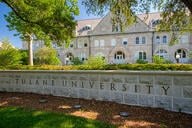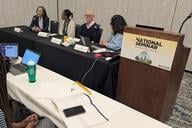You have /5 articles left.
Sign up for a free account or log in.
A federal judge ruled Monday that the state of Maryland is perpetuating a segregated higher education system by permitting program duplication that discourages enrollments at historically black colleges.
The judge ordered mediation on a possible solution that could include the addition of many programs at the state's four public historically black colleges and that could also result in significant changes at predominantly white institutions. "It is also likely that the transfer or merger of select high-demand programs from TWIs to HBIs will be necessary," wrote Judge Catherine C. Blake, using the acronyms for traditionally white and historically black institutions.
While Judge Blake found that the state's distribution of academic programs constitutes illegal discrimination, she rejected other claims brought in a lawsuit by supporters of historically black colleges. For instance, she found no evidence that the state's funding system is inherently discriminatory, even if black institutions receive less money than do their white counterparts.
Maryland's Public Black Colleges
- Bowie State University
- Coppin State University
- Morgan State University
- University of Maryland-Eastern Shore
Michael D. Jones, lead lawyer for the black college advocates who sued in the case, said that it was an "extraordinarily significant" win for historically black colleges over all. He said that he was disappointed by the ruling on the state's budget system.
But he said that addressing the program duplication issue will by definition result in a major infusion of state support to historically black colleges. He also said that it was the issue of duplicative programs that first led supporters of black colleges to plan the lawsuit. "This is a very important finding -- one Maryland fought all the way," he said.
A statement released late Monday by the office of Governor Martin O'Malley, a Democrat, primarily focused on the judge's finding that the funding system used by the state was not discriminatory, and stressed the governor's commitment to quality higher education for all Marylanders.
With regard to the program duplication finding, the statement said: "[W]e are proud of the multitude of excellent academic programs that exist throughout the state, and we respectfully disagree with the court’s conclusions regarding duplication. We are continuing to review today’s decision and are considering all of our options, including resolving the lone remaining issue through constructive mediation."
Judge Blake heard closing arguments in the case nearly a year ago, and her ruling has been anxiously awaited not only in Maryland, but in other states where supporters of public historically black colleges have been considering the tactic of suing states over what they perceive as inequitable treatment. For example, supporters of Cheyney University, a historically black institution in Pennsylvania, who have threatened to sue that state, have asked for assurances that nearby institutions will not be permitted to duplicate Cheyney programs.
The 60-page decision was largely based on U.S. v. Fordice, a 1992 Supreme Court decision that found that Mississippi had not done enough to fully desegregate its public colleges, decades after it allowed students of all races to enroll at all institutions.
Judge Blake noted that the Fordice ruling outlined how policies can be deemed unconstitutional. First a plaintiff must show that a policy is "rooted in" past segregated policies. If a plaintiff does so, a state can win the case by demonstrating -- as the judge said Maryland failed to do on the issue of duplicative programs -- that the policy does not have any current "segregative effects." And then the state can again win by showing that the challenged policy cannot be "practicably eliminated."
The issue of program duplication, Judge Blake wrote, was clearly part of the de jure system of segregation, reflecting "the whole notion of separate but equal."
And the judge cited much evidence that program duplication still exists and hurts black colleges and discourages integration. She particularly was critical of the state for permitting the duplication of high demand programs. One of the prime theories of higher education desegregation has been that placing unique programs at historically black colleges would attract white students and encourage desegregation.
"Maryland’s HBIs offer only 11 non-duplicated, high-demand, noncore programs, compared with 122 such programs at TWIs, for an average of 17 per TWI and only 3 per HBI," Judge Blake wrote. "Unique, high-demand programs are a key reason white students attend HBIs in other states, and, without them, HBIs 'are identified by their racial history as opposed to [their] programs.'"
Further, Judge Blake wrote that Maryland has failed to follow through on its pledges to create more high-demand programs at historically black colleges and has permitted predominantly white institutions to start programs that compete with those at black colleges.
She cited the creation of a joint M.B.A. program by Towson University and the University of Baltimore in 2005, over the objections of historically black Morgan State University. Morgan officials, with backing from officials at the U.S. Education Department's Office for Civil Rights, warned that the program would duplicate one at Morgan.
When the state's higher education division moved ahead anyway, an assistant attorney general wrote a memo -- quoted by the judge -- saying of this action that "there is little question that the proposed M.B.A. program, if approved, would constitute 'unnecessary program duplication' as that term of art is defined and articulated in federal law."
Judge Blake went on to say that when the state has approved duplicative programs, enrollments shift (and funds shift too) from institutions that serve many black students to institutions that serve fewer black students. She said that when Towson introduced a computer science master's program, enrollment at a similar program at historically black Bowie State fell from 119 to 29. Enrollment in the program at Towson grew from 23 to 101.
She noted that the University of Maryland-Eastern Shore is the most desegregated of Maryland's public black colleges (with 18 percent non-black enrollment). It is also the black university facing the least program duplication.
While Judge Blake faulted Maryland officials for failing to adequately prevent program duplication, Maryland has sometimes been criticized for doing just that. For example, University of Maryland University College, a primarily online institution, operates a program that trains community college administrators, primarily through online work, but with some periods in residence. Because historically black Morgan State has a program that trains community college administrators, the state bars UMUC from admitting Maryland residents to its program -- a rare instance of a state requiring one of its public institutions not to serve state residents.
The judge could have ordered a new set of legal proceedings on remedies to the violations she found, but she suggested mediation would be a better approach.
Jones, the lead lawyer for the coalition that sued Maryland, said he was pleased to proceed with mediation. He said that to deal with the issues noted by the judge, the state would need to provide significant enhancements to black colleges, not just authorizing programs, but providing the faculty slots and facilities to support those programs.
William Kirwan, chancellor of the University System of Maryland, said via e-mail: "While I am still digesting the judge's 60 plus page finding, she seems to have said two things. First, she states emphatically that the state has met its obligation for operating and capital funding of its HBU institutions. Secondly, she raises issues about program duplication and urges further discussion between the parties on this issue, possibly with the use of a mediator. I'm confident that the state will give serious consideration to this recommendation."




